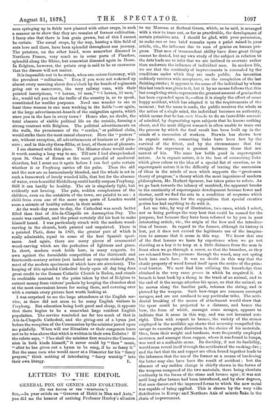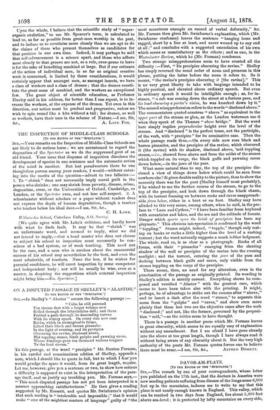LETTERS TO THE EDITOR.
GENERAL FOX ON GENIUS AND EVOLUTION.
[To THE EDITOR OF TED " SPECTATOR:1 SIR,—In your article on "Grooves of Habit in Men and Ants," you did me the honour of noticing Professor Huxley's allusion to my Museum at Bethnal Green, which, as he said, is arranged with a view to trace out, as far as practicable, the development of certain primitive arts. I should be glad, with your permission, to make one or two brief remarks upon a point raised in your article, viz., the influence due to men of genius on human pro- gress. That men of transcendent ability have done great things cannot be denied, but my own study of the subject in relation to the Arts leads me to infer that we are inclined to overrate rather than underrate the influence of individual men. In modern life, we see that the continuity of improvements is concealed by the conditions under which they are made public. An invention suddenly receives wide acceptance, on the completion of the last finishing stroke ; it appears in the name of the individual by whom this last touch was given to it, but it by no means follows that this last completing stroke represents the greatest amount of genius that has been expended upon it,—often it is simply the effect of some happy accident, which has adapted it to the requirements of the moment ; but the name is made, the public receives the whole as the action of a single mind, the individual becomes an authority, which means that he has carte blanche to do an incredible amount of mischief, by dogmatising upon subjects that he knows nothing about, and the most diligent research is often unable to trace out the process by which the final result has been built up in the minds of a succession of workers. Darwin has shown how in organic nature, connecting links have been lost by the survival of the fittest, and by the circumstance that the struggle for supremacy is greatest between those that are nearest of kin. The same law holds good in superorganic nature. As in organic nature, it is the loss of connecting links which gives colour to the idea of a special fiat of creation, so in superorganic nature it is the difficulty of tracing the succession of ideas in the minds of men which supports the "great-man theory of progress," a theory which the most ingenious of modern philosophers, Mr. Herbert Spencer, has taken pains to refute. As we go back towards the infancy of mankind, the apparent breaks in the continuity of superorganic development become fewer and shorter, until we find the arts in a condition of sequence which scarcely leaves room for the supposition that special creative genius has had anything to do with it.
Let me take, by way of illustration, two cases, which I select, not as being perhaps the very best that could be named for the purpose, but because they have been referred to by you in your interesting article, viz., the origin of the bow and the introduc- tion of bronze. In regard to the former, although its history is
lost, yet it does not exceed the legitimate use of the imagina- tion to assume that it arose in this way. We know that one of the first lessons we learn by experience when we go out shooting as a boy is to keep at a little distance from the man in front when we go through a cover, so that the branches, as they are released from his pressure through the wood, may not spring back into one's face. It was no doubt in this way that the elastic property of wood forced itself upon the notice of the prim- xval hunter. We next find him utilising the knowledge thus obtained in the very same groove in which he acquired it. A branch is bent back by a thong in the track of an animal, and to the end of it the savage attaches his spear, so that the animal, as he moves along the familiar path, releases the string, and is pierced by the weapon. Such bow-traps are common amongst savages, and are not confined to any particular tribe. The acci- dental breaking of the means of attachment would show that the spear could be projected to a distance, and hence the bow, the form of which, amongst some savages, appears to indicate that it arose in this way, and was not invented out- right. Then with respect to bronze, the variety of the stones employed in the neolithic age shows that necessity compelled the savage to exercise great discretion in the choice of his materials. Ores, from their weight and hardness, were frequently employed as stones, and amongst them copper, where it was found in lumps, was used as a malleable stone. Its ductility, if not its fusibility, would soon reveal itself through the accidents of the cooking-fire ; and the fact that tin and copper are often found together leads to the inference that the use of the former as a means of hardening the latter may also have been the result of accident ; but the absence of any sudden change is chiefly shown in the forms of the weapons composed of the two materials, there being absolute continuity in the forms of the stone and bronze ages ; it was not until long after bronze had been introduced, and by slow degrees, that men discovered the improved forms to which the new metal was capable of being applied. This is shown by the very wide distribution in Europa and Northern Asia of minute links in the chain of improvement. Upon the whole, I believe that the scientific study of "super- organic evolution," to use Mr. Spencer's term, is calculated to lead us, as far as possible from great-man worship in the past, and to induce us to scrutinise more closely than we are apt to do the claims of those who present themselves as candidates for that position in our own time. Indeed, it may perhaps be said that self-advancement is a science apart, and those who adhere most closely to that groove are not, as a rule, over-prone to leave it for the sake of benefiting mankind at large. But if our estimate of the action of individual men, in so far as original creative work is concerned, is limited by these considerations, it would certainly appear that amongst men, as amongst insects, we have a class of workers and a class of drones ; that the drones consti- tute the great mass of mankind, and the workers an exceptional few. The great object of scientific education, as Professor Huxley said in his address, far better than I can repeat, is to in- crease the workers, at the expense of the drones. Yet even in this direction, our action must be gradual and progressive, unless we wish to spin round like a kite without a tall; for drones, as well as workers, have their uses in the scheme of Nature.—I am, Sir,































 Previous page
Previous page